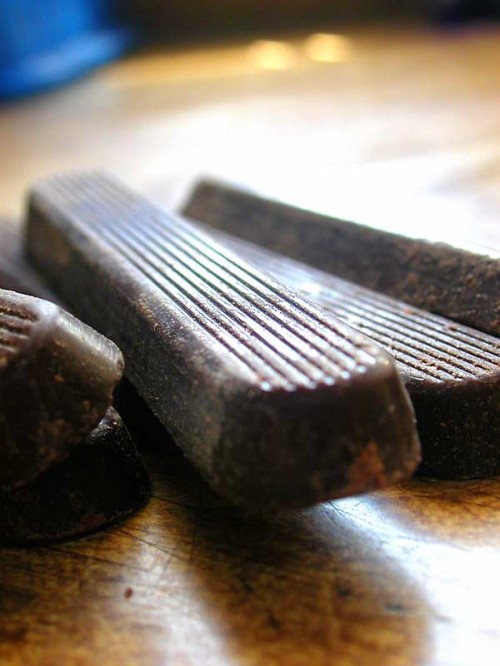A Chocolatey Harvard GSC Mini-Course

chocolate sticks by chotda
Happy Monday to all!
Harvard’s Graduate School of Arts and Sciences offers an interesting selection of short term courses, panel discussions, and workshops every January. As part of this robust programming, a number of mini-courses taught by and for graduate students are chosen and sponsored by the Harvard Graduate Student Council.
This month, I’ll be teaching a course entitled Chocolate, Culture, and the Politics of Food to a group of fellow graduate students from a wide variety of disciplines. The description and a brief outline of what we’ll cover is below.
Class begins today and I’m optimistic that we will have a delicious first meeting. Updates to come over the next couple of weeks. In the meantime, do let us know what you think of the course description.
Chocolate, Culture, and the Politics of Food
This course will examine the sociohistorical legacy of chocolate, with a delicious emphasis on the eating and appreciation of the so called “food of the gods,” the focus of course instructor Carla Martin’s blog, Bittersweet Notes. Course participants will learn about the history of cacao cultivation and the present day state of the chocolate industry; the science behind cacao and chocolate; the diverse cultural constructions surrounding it; the economic forces that have come to largely control it; and the implications of international politics, the food movement, and alternative trade models for its future. We will ask questions of chocolate related to racial and socioeconomic injustice, responsible development, honesty in production and marketing, hierarchies of quality, and myths of purity. Participants in this mini-course can also expect to learn to better identify chocolate that suits their individual tastes, cravings, cooking ambitions, and ethics. Course participants will be asked to contribute approximately $20 to cover the cost of chocolate for tasting (this dollar amount will depend on enrollment).
Course details
Our main reference text will be The New Taste of Chocolate: A Cultural & Natural History of Cacao with Recipes (2009) by Maricel Presilla. Optional supplemental readings will be made available, with directed recommendations from the instructor. All course meetings will involve multimedia presentation and discussion, with special attention given to the utility of digital research tools, blogging, and social media for learning and research on chocolate.
In addition, we will taste chocolate at each course meeting, working to train our palates to begin to recognize different types, origins, and compositions of chocolate. It will become clear that sociohistorical context is most often inseparable from the resulting flavor and quality of chocolate. Our sixth course meeting will combine presentation and discussion with visits to local chocolatiers and chocolate makers in the Cambridge area. An optional seventh meeting for a tour and conversation at Taza Chocolate factory in Somerville will be scheduled at a time convenient for the group.
The course is divided into six two-hour meetings, each devoted to one part of chocolate’s story:
1. Sociohistorical legacy of cacao and the rise of the global chocolate industry. Chocolate in culture: as food, currency, medicine, royal privilege, aphrodisiac, entertainment, luxury, etc. Examples will be drawn from history, literature, music, art, and film, and will highlight chocolate’s relationship to social issues like race, gender, sexuality, post colonialism, and international politics.
Tasting: single origin, single bean Latin American chocolate.
2. The science of growing and identifying cacao varieties, geographic and environmental requirements, chemistry and physics of chocolate making, and health benefits and concerns in chocolate.
Tasting: single origin chocolate from around the world.
3. Chocolate industry monoliths, scandal, and intrigue. The ongoing saga of big agriculture, multinational corporations, international relations, commodity trading, labor rights and abuses, and enormously powerful brands.
Tasting: some of the world’s most popular chocolate bars.
4. Pastry chefs, chocolatiers, craft chocolate makers, and chocolate connoisseurs. The food movement participants driving current innovations in chocolate and working to preserve some of the world’s heritage cacao varieties.
Tasting: industry-changing, cutting-edge craft chocolate bars and artisanal bonbons.
5. Chocolate, food advocacy, and social media – where international politics, the food movement, food politics, and alternative trade models meet.
Tasting: chocolate marketed as fairly traded and ethically sourced.
6. Chocolate in the Boston area, from the revolutionary era to the present. The history of Baker’s Chocolate in Dorchester (first to produce chocolate in the United States), NECCO’s candy row in Cambridge (do you smell Tootsie Rolls?), and a visit to local chocolatiers and chocolate makers.
Tasting: chocolate from local chocolatiers and chocolate makers.
comments
Leave a Reply

